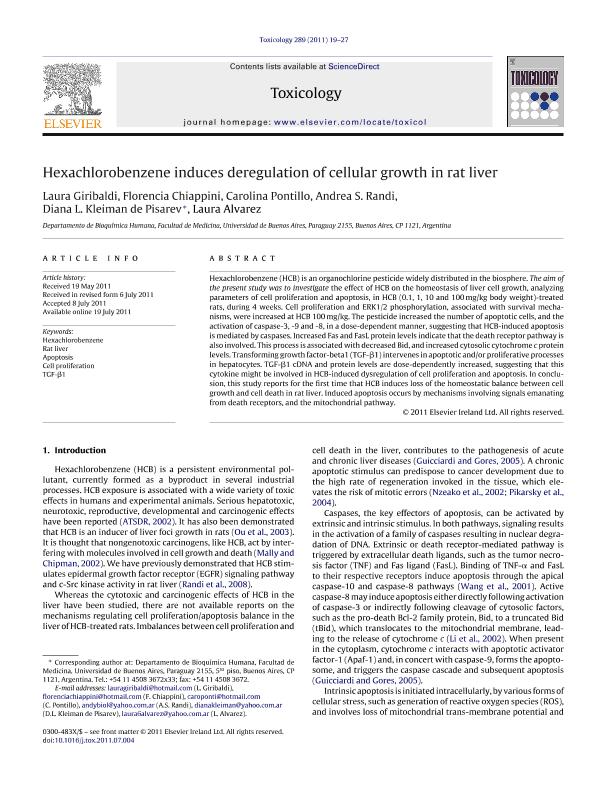Artículo
Hexachlorobenzene Induces Deregulation of Cellular Growth in Rat Liver
Giribaldi, María Laura ; Chiappini, Florencia Ana
; Chiappini, Florencia Ana ; Pontillo, Carolina Andrea
; Pontillo, Carolina Andrea ; Randi, Andrea Silvana
; Randi, Andrea Silvana ; Kleiman, Diana Leonor
; Kleiman, Diana Leonor ; Alvarez, Laura
; Alvarez, Laura
 ; Chiappini, Florencia Ana
; Chiappini, Florencia Ana ; Pontillo, Carolina Andrea
; Pontillo, Carolina Andrea ; Randi, Andrea Silvana
; Randi, Andrea Silvana ; Kleiman, Diana Leonor
; Kleiman, Diana Leonor ; Alvarez, Laura
; Alvarez, Laura
Fecha de publicación:
10/2011
Editorial:
Elsevier Ireland
Revista:
Toxicology
ISSN:
0300-483X
Idioma:
Inglés
Tipo de recurso:
Artículo publicado
Clasificación temática:
Resumen
Hexachlorobenzene (HCB) is an organochlorine pesticide widely distributed in the biosphere. The aim of the present study was to investigate the effect of HCB on the homeostasis of liver cell growth, analyzing parameters of cell proliferation and apoptosis, in HCB (0.1, 1, 10 and 100. mg/kg body weight)-treated rats, during 4 weeks. Cell proliferation and ERK1/2 phosphorylation, associated with survival mechanisms, were increased at HCB 100. mg/kg. The pesticide increased the number of apoptotic cells, and the activation of caspase-3, -9 and -8, in a dose-dependent manner, suggesting that HCB-induced apoptosis is mediated by caspases. Increased Fas and FasL protein levels indicate that the death receptor pathway is also involved. This process is associated with decreased Bid, and increased cytosolic cytochrome c protein levels. Transforming growth factor-beta1 (TGF-β1) intervenes in apoptotic and/or proliferative processes in hepatocytes. TGF-β1 cDNA and protein levels are dose-dependently increased, suggesting that this cytokine might be involved in HCB-induced dysregulation of cell proliferation and apoptosis. In conclusion, this study reports for the first time that HCB induces loss of the homeostatic balance between cell growth and cell death in rat liver. Induced apoptosis occurs by mechanisms involving signals emanating from death receptors, and the mitochondrial pathway.
Palabras clave:
APOPTOSIS
,
CELL PROLIFERATION
,
HEXACHLOROBENZENE
,
RAT LIVER
,
TGF-Β1
Archivos asociados
Licencia
Identificadores
Colecciones
Articulos(CEFYBO)
Articulos de CENTRO DE ESTUDIOS FARMACOLOGICOS Y BOTANICOS
Articulos de CENTRO DE ESTUDIOS FARMACOLOGICOS Y BOTANICOS
Articulos(OCA HOUSSAY)
Articulos de OFICINA DE COORDINACION ADMINISTRATIVA HOUSSAY
Articulos de OFICINA DE COORDINACION ADMINISTRATIVA HOUSSAY
Articulos(SEDE CENTRAL)
Articulos de SEDE CENTRAL
Articulos de SEDE CENTRAL
Citación
Giribaldi, María Laura; Chiappini, Florencia Ana; Pontillo, Carolina Andrea; Randi, Andrea Silvana; Kleiman, Diana Leonor; et al.; Hexachlorobenzene Induces Deregulation of Cellular Growth in Rat Liver; Elsevier Ireland; Toxicology; 289; 1; 10-2011; 19-27
Compartir
Altmétricas



